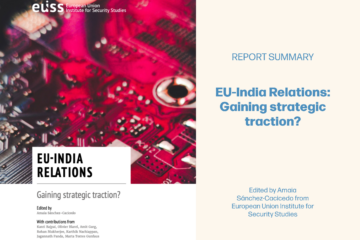Report summary: African Spaces: The new geopolitical frontlines
African Spaces: The new geopolitical frontlines. Edited by Giovanni Faleg. With contributions from Eyob Balcha Gebremariam, Fergus Kell, Katariina Mustasilta, Luigi Narbone, Carlo Palleschi, Patryk Pawlak, Luca Ranieri, Jean Ramier, Norman Sempija, Alex Vines, Sean Woolfrey, March 2022, 74 Pages, https://www.iss.europa.eu/sites/default/files/EUISSFiles/CP_173_0.pdf
Africa’s geopolitical importance continues to rise rapidly as foreign powers are racing to project their influence on the continent in order to further their own economic and political goals. This paper identifies eight geographical and functional spaces that are fast becoming the frontlines of geopolitics in Africa.
The geographical spaces that have acquired new significance and gained geopolitical prominence include:
1. Sands: The regions North and South of the Sahara are being redefined from a dry frontier to a space of social and economic connectivity, affecting international policy and raising domestic economic aspirations.
2. Oceans: Global rivalries and piracy threats to shipping routes are intensifying in two key geostrategic regional maritime spaces on opposing sides of Africa: the Western Indian Ocean and the Gulf of Guinea.
3. Cities: Increasing social pressures, economic transformations, and political mobilisation – all originating within urban centres – means that rapid urbanisation has put cities at the centre of Africa’s geopolitical dynamics.
4. Peripheries: Because of the proliferation of violent conflicts by Salafi-jihadist groups throughout Africa, peripheries are key locations of security dynamics located on the margins of central state power. The second section describes four functional spaces, which are non physical areas where geopolitical dynamics are at play, driven by new technology, societal and economic factors.
5. Trade: The way that governments, firms and citizens interact with each other economically has been greatly changed by the creation of Africa’s free trade area (AfCFTA). This has also changed the way foreign partners engage with African countries.
6. Digital: As rapid development has greatly increased internet access in Africa and in turn digitised economic and social development, foreign powers like China, Russia and the EU are keen to compete for the ability to shape African digital policy and development.
7. Jobs: Africa’s rising youth population creating a ‘youth bulge’ of high unemployment in a large informal employment sector. Despite the opportunities associated with globalisation, African youths have become more marginalised and socially vulnerable.
8. Information: Africa’s developing infosphere, where knowledge, information, and narratives circulate, is increasingly subject to manipulation and fake news, something that foreign powers are trying to exploit.
Each space is examined through three observational lenses. First, how the space is transforming based on observable change. Second, why the space is changing, what are the geopolitical drivers of the transformation and what are the new power relations that are unfolding. And third, what are the policy implications for both Africa and foreign nations seeking to mitigate geopolitical risks.
This summary is written by Anna Thomsen, Intern at the Danish Foreign Policy Society on a Metcalf Research Grant from the University of Chicago and undergraduate student at the University of Chicago studying Political Science and Eastern European Studies, with a focus on the Balkans as well as the Russia-Ukraine war.


